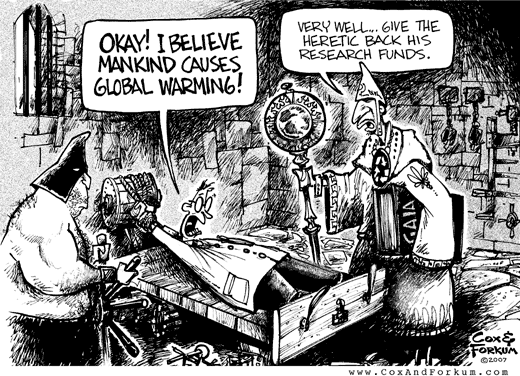
Cartoon by Cox and Forkum.
Richard Lindzen is a professor of meteorology at Massachusetts Institute of Technology who thinks that man-caused global warming is real, but will hardly cause any change at all. The NY Times has an interesting article on him: A Climate Change Dissenter Who Has Left His Mark on U.S. Policy. Here are some choice excerpts:
[…] [Lindzen argues that] the answer that emerges from most climate models is wrong because they assume the Earth’s clouds and water will amplify the rising heat. According to Lindzen’s calculations, the clouds should have the opposite effect, minimizing the warming effect.
In his paper, Rahmstorf added a “Personal Postscript”: “Can Lindzen seriously believe that a vast conspiracy of thousands of climatologists worldwide is misleading the public for personal gain? All this seems completely out of touch with the world of climate science as I know it and, to be frank, simply ludicrous.” In a reply, Lindzen skewered Rahmstorf in a footnote, arguing that the German scientist was “addicted to the use of words like ‘entirely,’ ‘fact,’ ‘irrefutable,’ etc. Such words are inappropriate to a primitive and immature science — which is what climate science is at present.“
Richard Goody, 90, who taught meteorology to Lindzen at Harvard, says the critics of his former pupil are “focusing on his propensity to debate. He [Lindzen] loves debating. He absorbs an enormous amount of information, and he loves arguing with you about it. Since he’s so well-informed and so smart, he usually wins. This doesn’t endear you to a lot of people.” […] Goody is quick to add: “But science is not about gentility. It’s about discussing the facts. He’s just doing what he should do.” […] “This machine turns out a number for something that will happen 100 years in the future. Science doesn’t usually work that way. There’s not much evidence about the behavior of these climate models,” he said.
[…] Roger Pielke Jr., a political scientist at the University of Colorado, specializes in studying the scientific process. He sees the rough-and-tumble of the climate debate as an unstable brew of science and politics. “If we were to view science as a field where a lot of conflicts happen, then Lindzen is an expected part of the scenery. But if science is a community where there is only one acceptable view, then Lindzen stands out.” Pielke blames environmental groups for making climate a two-sided debate.
[…] In a paper he wrote earlier this year, he managed to lash out at his scientific critics, bureaucrats, politicians — including former Vice President Al Gore — and environmental groups before training his rhetoric on the public. “And finally, there are the numerous well-meaning individuals who have allowed propagandists to convince them that in accepting the alarmist view of anthropogenic climate change, they are displaying intelligence and virtue. For them, their psychic welfare is at stake,” he wrote.
The paper gives the essence of his argument, which is that, while man-caused warming certainly exists, by itself it is small. It was roughly 0.7 degree Celsius in the 20th century. If the amount of carbon dioxide in the atmosphere doubles, which many scientists predict that it will by the end of this century, that will increase global mean temperatures by a little more than 1 degree, he thinks. “A hundred years from now, I don’t really know, but I don’t think it [the climate] will be radically different. The climate is always changing. It’s natural variability,” he said in an interview.
[…] “Now we’re seeing a doubling down, a desperate movement among professional [scientific] societies that have committed themselves to the issue,” he said. Asserting that groups such as the National Academy of Sciences or the American Meteorological Society are wrong about climate projections and proposed government responses doesn’t endear Lindzen to the nation’s science establishment. But he doesn’t stop there. He proposes to cut off most government funding because it rewards what he calls “alarmist” studies about climate change and discourages dissenting views. “There has to be a return to non-government support of science,” he told the Cato group. [A Climate Change Dissenter Who Has Left His Mark on U.S. Policy]
